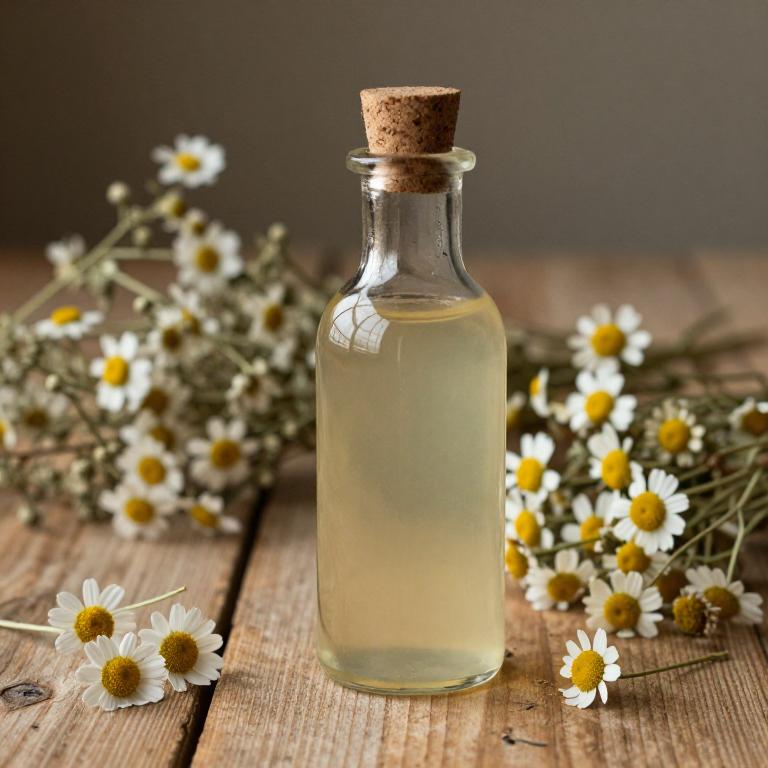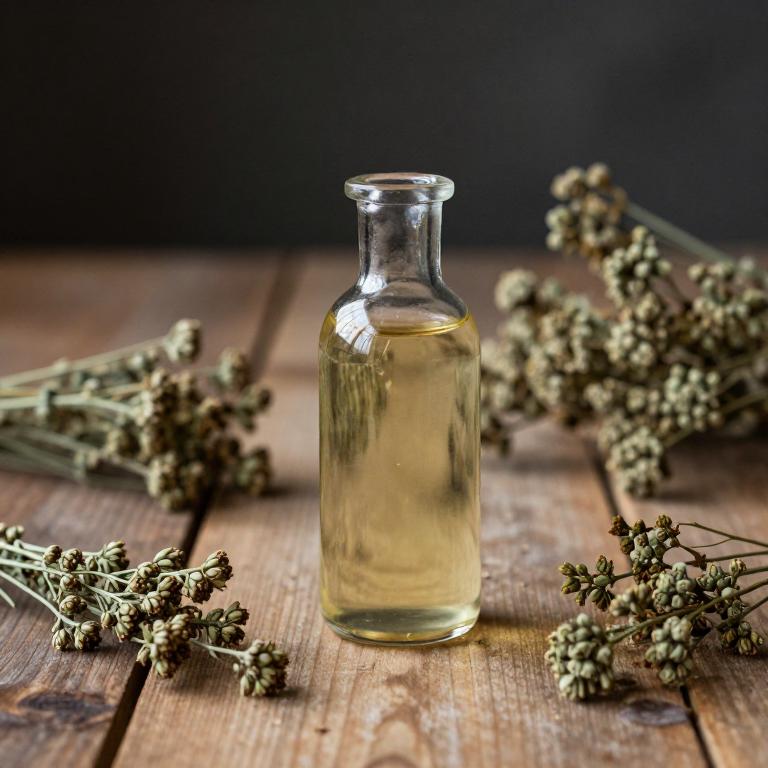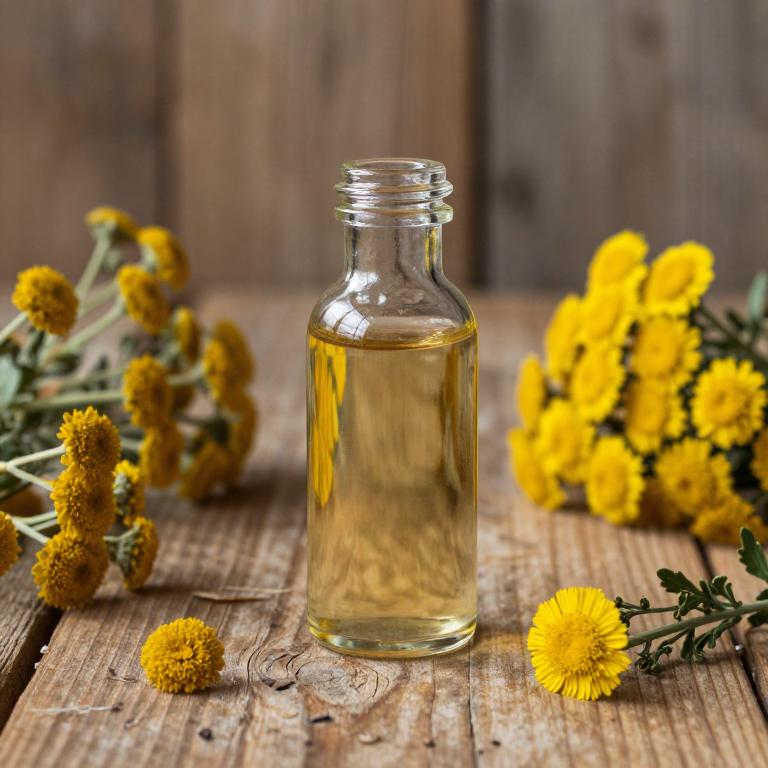10 Best Herbal Syrups For Allergies

Herbal syrups for allergies are natural remedies that combine plant-based ingredients to help alleviate common allergy symptoms such as sneezing, itching, and congestion.
These syrups often contain herbs like nettle, echinacea, and licorice root, which are known for their anti-inflammatory and immune-supporting properties. They are typically considered a gentler alternative to conventional antihistamines, offering potential relief without the side effects associated with pharmaceutical drugs. Many people turn to herbal syrups as part of a holistic approach to managing seasonal allergies, often in conjunction with dietary changes and environmental adjustments.
However, it's important to consult with a healthcare professional before using these syrups, especially for children or individuals with existing health conditions.
Table of Contents
- 1. Stinging nettle (Urtica dioica)
- 2. Echinacea (Echinacea purpurea)
- 3. German chamomile (Chamomilla recutita)
- 4. Plantain (Plantago lanceolata)
- 5. Wormwood (Artemisia vulgaris)
- 6. Black elderberry (Sambucus nigra)
- 7. Salvia (Salvia officinalis)
- 8. Rosemary (Rosmarinus officinalis)
- 9. St. john's wort (Hypericum perforatum)
- 10. Field horsetail (Equisetum arvense)
1. Stinging nettle (Urtica dioica)

Urtica dioica, commonly known as stinging nettle, has been traditionally used in herbal medicine for its potential benefits in alleviating allergy symptoms.
When prepared as a syrup, Urtica dioica can help reduce inflammation and suppress histamine release, which are key factors in allergic reactions. This herbal syrup is often used to support the immune system and may help ease symptoms such as sneezing, runny nose, and itchy eyes. It is typically made by simmering fresh or dried nettle leaves with honey or another sweetener to create a soothing and palatable form.
While it is generally considered safe for most people, it is advisable to consult a healthcare professional before using it, especially for those with known allergies or chronic health conditions.
2. Echinacea (Echinacea purpurea)

Echinacea purpurea, commonly known as purple coneflower, is a popular herbal remedy often used to support immune function and alleviate allergy symptoms.
Herbal syrups made from Echinacea purpurea are typically made by extracting the plant's flowers and roots with alcohol or water, resulting in a concentrated liquid form that is easy to consume. These syrups are believed to help reduce the severity and frequency of allergic reactions by boosting the body's natural defenses and reducing inflammation. While some studies suggest potential benefits, more research is needed to fully understand their efficacy for allergies.
As with any herbal supplement, it is important to consult with a healthcare provider before use, especially for individuals with known allergies or taking other medications.
3. German chamomile (Chamomilla recutita)

Chamomilla recutita, commonly known as German chamomile, is often used in herbal syrups to help alleviate allergy symptoms due to its anti-inflammatory and antihistamine properties.
These syrups are typically made by steeping dried chamomile flowers in a base of honey or sugar syrup, creating a soothing and easy-to-consume remedy. They are particularly popular for relieving symptoms such as sneezing, runny nose, and itchy eyes associated with seasonal allergies. While not a substitute for conventional allergy medications, chamomile syrups can serve as a natural complement to support the body’s immune response.
However, it is important to consult with a healthcare provider before use, especially for children or individuals with known allergies to plants in the daisy family.
4. Plantain (Plantago lanceolata)

Plantago lanceolata, commonly known as narrow-leaf plantain, has been traditionally used in herbal medicine for its soothing and anti-inflammatory properties.
Herbal syrups made from Plantago lanceolata are often utilized to alleviate symptoms of allergies due to their ability to reduce throat irritation and congestion. These syrups are typically prepared by combining the dried leaves of the plant with honey or other natural sweeteners, enhancing both flavor and therapeutic effects. The mucilage present in Plantago lanceolata helps to coat and protect the respiratory tract, providing relief from allergy-related discomfort.
While generally considered safe, it is advisable to consult a healthcare professional before using these syrups, especially for children or individuals with allergies to honey or other ingredients.
5. Wormwood (Artemisia vulgaris)

Artemisia vulgaris, commonly known as wormwood, has been traditionally used in herbal medicine for its potential anti-allergic properties.
Herbal syrups made from artemisia vulgaris may help alleviate symptoms of seasonal allergies due to their antihistaminic and anti-inflammatory effects. These syrups are often prepared by combining the dried leaves and flowers of the plant with honey or other natural sweeteners to enhance palatability. While some studies suggest that artemisia may support immune system function, it is important to consult with a healthcare provider before using it, especially for individuals with allergies or those taking other medications.
As with any herbal remedy, the effectiveness and safety of artemisia vulgaris syrups can vary, and more research is needed to fully understand their role in allergy management.
6. Black elderberry (Sambucus nigra)

Sambucus nigra, commonly known as the European elderberry, has been traditionally used in herbal medicine for its potential immune-boosting properties.
While it is often associated with colds and flu, recent research suggests that elderberry may also offer benefits for managing allergy symptoms. The syrup form of Sambucus nigra is popular due to its pleasant taste and ease of consumption, making it a favored choice for those seeking natural remedies. It is believed to support the body's natural defenses and may help reduce the severity of allergic reactions by modulating immune responses.
However, it is important to consult with a healthcare provider before using elderberry syrup, especially for individuals with known allergies or those taking other medications.
7. Salvia (Salvia officinalis)

Salvia officinalis, commonly known as sage, has been traditionally used in herbal medicine for its potential health benefits, including alleviating allergy symptoms.
Herbal syrups made from sage are often prepared by infusing the leaves in a sweetened liquid, making them easy to consume and suitable for children and adults alike. These syrups are believed to support respiratory health by reducing inflammation and mucus production, which are common in allergic reactions. Some studies suggest that sage contains compounds with antihistamine properties, which may help ease symptoms such as sneezing and congestion.
However, it is important to consult a healthcare professional before using sage syrup, especially for individuals with existing medical conditions or those taking other medications.
8. Rosemary (Rosmarinus officinalis)

Rosmarinus officinalis, commonly known as rosemary, has been traditionally used for its aromatic and medicinal properties, and its essential oils and herbal syrups are increasingly being explored for their potential to alleviate allergy symptoms.
These syrups often contain rosemary extract, which is believed to have anti-inflammatory and antihistamine-like effects that may help reduce allergic reactions. The calming and decongestant properties of rosemary can support respiratory health, making it a natural alternative for those seeking relief from nasal congestion and sinus pressure. While more research is needed to fully understand its efficacy, many users report improved breathing and reduced sneezing when using rosemary-based syrups.
As a complementary therapy, rosemary herbal syrups can be a valuable addition to a holistic approach to managing allergies.
9. St. john's wort (Hypericum perforatum)

Hypericum perforatum, commonly known as St. John's Wort, is a herbal plant that has been traditionally used for its potential health benefits.
While it is well-known for its use in treating mild depression, it has also been explored for its possible role in alleviating allergy symptoms. Some studies suggest that the active compounds in Hypericum perforatum, such as hypericin and flavonoids, may have anti-inflammatory and antihistamine properties that could help reduce allergic reactions. Herbal syrups made from St. John's Wort are sometimes used as a natural alternative to conventional allergy medications, though they should not replace prescribed treatments without medical advice.
As with any herbal remedy, it is important to consult a healthcare provider before use, especially if taking other medications, due to potential interactions.
10. Field horsetail (Equisetum arvense)

Equisetum arvense, commonly known as field horsetail, has been traditionally used in herbal medicine for its potential anti-inflammatory and antihistamine properties.
Herbal syrups made from Equisetum arvense are often recommended for alleviating symptoms of seasonal allergies due to their ability to reduce nasal congestion and support respiratory health. These syrups are typically prepared by combining the dried herb with honey or other natural sweeteners to enhance palatability. While research on its efficacy for allergies is ongoing, many holistic practitioners use Equisetum arvense as a complementary therapy.
As with any herbal remedy, it is important to consult a healthcare professional before use, especially for individuals with existing medical conditions or those taking other medications.